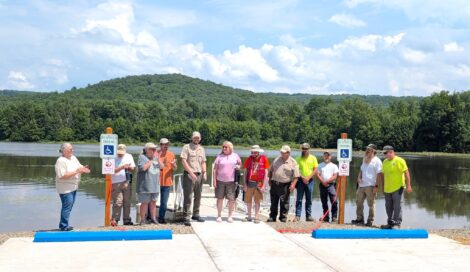Local department prepared for all situations
The rioting, looting, and other violence that followed the death of George Floyd has not made its way to Warren County.
There were many incidents around the country — not all of them in places where there were even accusations of police wrong-doing.
Numerous states called out the National Guard.
The protests have spread to Warren, but not the violence. That there hasn’t been violence doesn’t mean local departments are unprepared.
“We get training in the academy of course, and we drill regularly for civil unrest and riots,” said Sgt. Ryan Nuhfer of the Pennsylvania State Police. “We have many specialized units that play a huge part in these situations.”
Some units gather intelligence.
Some are more direct.
The Special Emergency Response Team (SERT) has ‘less lethal’ equipment and is trained to used it, Nuhfer said. Other agencies can call upon the SERT in emergencies.
“We also have chemical munitions — tear gas, OC spray, etc. — that can be used at the platoon level during these situations,” Nuhfer said.
“We get regular situational reports about unrest,” he said. “At the station level, we review training, tactics, and equipment. If we know there’s something coming up, we drill and prepare.”
Since the beginning of the COVID-19 pandemic, the state police has been operating at a heightened alert status. The unrest following Floyd’s death also contributed to the alert status level.
There are different requirements of troopers depending on the alert status. For example, at a high level, troopers are required to carry riot gear with them.
The Quick React Force Team makes sure there are troopers who are ready to move out to help with situations anywhere in the state on short notice. Nuhfer was assigned to that force a week ago, but was not called out.
Recently, unrest was building in McKean County and troopers from all over Troop E staged in Warren to be able to react quickly to Bradford, Nuhfer said.
Warren County Sheriff Ken Klakamp compared the office’s training and policies for responding to labor disputes to what might be done in the case of a violent protest.
“Once a temporary or permanent injunction is issued by the court” it is up to his office to enforce that injunction, he said. “Some (strikes) are peaceful and some are not.”
“The vast majority of both peaceful and potential hostile incidents are defused through communications,” he said. “Don’t go into a situation being negative. Communicate with leaders.”
“One thing I was taught years ago is you get more with honey than vinegar,” Klakamp said. “If there are subjects that need to be arrested it can be done following the event. The exception would be immediate serious bodily injury or death.”
There Sheriff’s Office and the Warren County jail share ‘less lethal’ equipment and the office has some protective gear that it doesn’t normally use that could be utilized in a large-scale situation, Klakamp said.
The City of Warren Police Department is up to date on protest protocols.
“The department officers received training as part of yearly updates from the Municipal Police Officer Education and Training Commission this year in regard to protests,” Chief Brandon Deppen said. “We also have a policy titled ‘unusual occurrences and special operations’ which gives guidance on civil disturbances.”
A previous Education and Training Commission update trained officers on ‘procedural justice.’
“PJ strategies are used to improve quality and outcomes of interactions between police and citizens, and improve officer safety through increased legitimacy,” Deppen said. The idea is a simple one — “citizens are treated fairly and with proper respect as human beings.”
Youngsville Borough Police would call upon another agency, like the State Police SERT, for assistance in the case of a potentially violent protest “in our quiet community,” Chief Todd Mineweaser said.
The department does have some non-lethal rounds, Mineweaser said, but typically those are intended for black bears that might pose a threat to the public rather than violent protests.
CAMERAS
In the case of the death of Floyd, cameras show officers in the wrong.
But, far more often, the presence of video shows officers doing the right thing, according to Deppen.
“Our department has been wearing body cameras for two-and-a-half years,” he said. “Video is reviewed on a constant basis.”
Youngsville Borough Police also wear body cameras, according to Mineweaser.
State Police are testing body cameras in a different part of the state. The pilot program is going well and Nuhfer expects cameras to be implemented in Troop E in the near future.
“The Sheriff’s Office currently does not use body cameras,” Klakamp said. “This has been based on cost. However the Sheriff’s Office working with the County Commissioners and the EMA Director have been approved for U.S. Department of Agriculture Rural Development funding.”
“Once the funding process is complete the Sheriff’s Office will be purchasing eight body cameras and five in-car dash cameras,” Klakamp said. “This should be within the next six months.”




